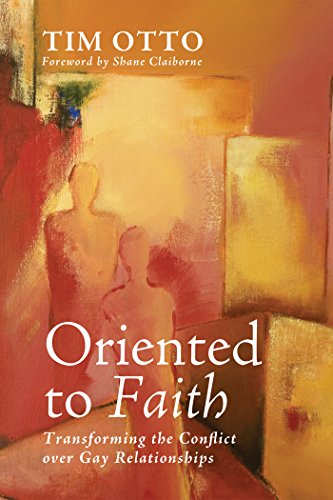 The debate surrounding homosexuality is one of the most contentious in the contemporary church, polarizing communions both locally and globally. Not surprisingly, most resources either locate themselves within a party line or sacrifice rigor for amiability. Thankfully, into the discussion comes Oriented to Faith: Transforming the Conflict over Gay Relationships, which combines depth and balance with a highly accessible style. Arising from the author’s life experiences and subsequent scriptural and theological reflection, and incorporating the resulting wisdom with a compelling blend of humility and authority, Oriented to Faith is an excellent example of “lived theology.”
The debate surrounding homosexuality is one of the most contentious in the contemporary church, polarizing communions both locally and globally. Not surprisingly, most resources either locate themselves within a party line or sacrifice rigor for amiability. Thankfully, into the discussion comes Oriented to Faith: Transforming the Conflict over Gay Relationships, which combines depth and balance with a highly accessible style. Arising from the author’s life experiences and subsequent scriptural and theological reflection, and incorporating the resulting wisdom with a compelling blend of humility and authority, Oriented to Faith is an excellent example of “lived theology.”
Rather than begin by claiming and defending one of two positions, Oriented to Faith approaches the conflict over gay relationships from a kingdom perspective and politic, with a deep commitment to ecclesial life. Otto undertakes careful theological examinations of such concepts as family, economy, sexuality, power, politics, and church. He promotes a more holistic biblical sexual ethic, rooted in his core commitment to an ethic of “covenantal fidelity.” Grounding and illustrating his scriptural work with personal vignettes, Otto guards against the theoretical imprisonment that often accompanies such conversations.
In a move that is both helpful and theologically accurate, Otto frames the discussion with the words of Augustine: “In essentials, unity, in non-essentials, diversity, in all things, charity.” He gives a brave and generous account of both sides of the discussion, considering the dual possibilities of “compassionate traditionalism” and “committed affirmation.” Neither is off the table, provided they incorporate humility and graciousness. Both the theological Left and Right—the affirmers and the traditionalists—have strengths worthy of acknowledgement, which Oriented to Faith does with a refreshing lack of guile. It recognizes both the difficulties and the promises of arriving at a communal, congregational position. Moreover, it explores the deeper issue of whether churches on both sides of the debate “live in a way that makes the ethic they are espousing possible.”
Those readers who scan the pages or skip to the last chapter to see which position the author holds as “right” will likely be disappointed. Instead, Otto warns against identifying and grasping the “correct” theological position that “makes us feel righteous at no cost to ourselves,” which then becomes “an alternative means of salvation, in which we don’t need the real God.” It is possible that this book may well fail to please either side of the homosexuality debate; indeed, Oriented to Faith does not propose to “please” anyone. Yet to reject it for its intellectual and theological hospitality would be regrettable, as it does more to move the church from conflict to communication than any resource present today.
In his letter to the church at Philippi, Paul admonishes the believers to “work out their salvation with fear and trembling,” doing all things “without grumbling or dispute” (Phil 2:12-13). Oriented to Faith does exactly this, addressing the most controversial issue of the day with humility, passion, and a bold commitment to the two great commandments: to love the Lord with all our heart, soul, mind, and strength, and to love our neighbors as ourselves.
Maria Russell Kenney is adjunct professor of Christian ethics at Asbury Theological Seminary in Wilmore, Ky., and a member of Common Life Community in Lexington.

